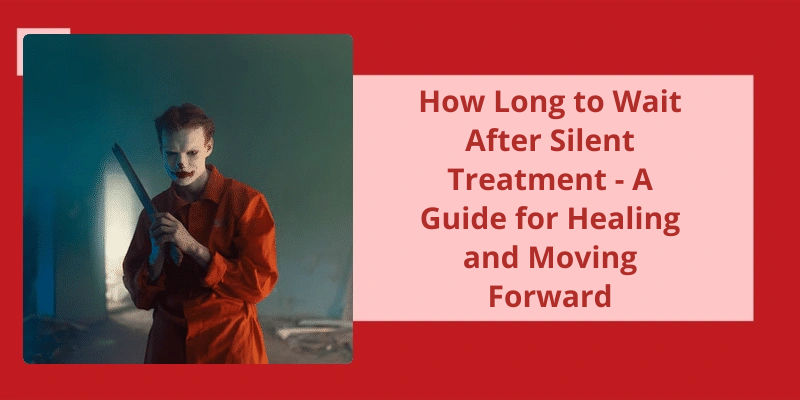However, sometimes taking time to cool down and reflect on a situation can be beneficial for both parties in a relationship. It allows each individual to take a step back and process their emotions before discussing the issue at hand. But when the silent treatment is prolonged or used for manipulative purposes, it can cause irreparable damage to the relationship. So, it's important to find a balance and determine the appropriate length of time to give each other space without crossing the line into emotional abuse.
How Long Will a Guy Give the Silent Treatment?
The silent treatment can be an incredibly effective tool for resolving conflicts and repairing relationships, but it’s important to use it judiciously and with care.
One key factor to keep in mind when using the silent treatment is that it shouldn’t be allowed to stretch on indefinitely. If you want to get the most out of this powerful communication tool, it’s essential to re-engage with your partner quickly and to start working through your issues as soon as possible.
The exact length of time that a guy will give the silent treatment will depend on a variety of factors, including the severity of the problem, the level of emotional investment in the relationship, and the specific personality and communication style of the individual involved.
However, as a general rule, it’s a good idea to aim for a relatively short period of silence, such as a few hours or a day or two. This allows both partners to cool down, reflect on the situation, and come back to the relationship with fresh eyes and a new perspective.
Understanding the duration and rationale behind a narcissist’s silent treatment can help those who’ve experienced it to navigate their interactions with these individuals in the future. While the length of time may vary, the common thread is the need for the narcissist to feel in control and to receive attention and validation from others. In the following section, we’ll explore some strategies for coping with and healing from the effects of a narcissist’s silent treatment.
Does the Silent Treatment Ever End?
However, it’s important to note that the silent treatment is a form of emotional abuse and manipulation that can have devastating effects on the victims mental health and well-being. It’s a way for the narcissist to exert control over the victim and to punish them for not meeting their demands or for challenging their authority.
Despite the pain and turmoil it causes, the silent treatment does eventually come to an end, although the timing and manner of it’s conclusion may vary greatly from one narcissist to another. Some narcissists may break their silence with a sudden burst of affection or a grand gesture of reconciliation, while others may simply resume their normal behavior as if nothing happened. Some may even pretend that the silent treatment never occurred, leaving the victim to wonder if they imagined the whole thing.
Narcissists are notorious for repeating patterns of emotional abuse and manipulation, and it’s common for them to cycle between periods of affection and adoration and periods of cold indifference or hostility. If you’re dealing with a narcissist who’s giving you the silent treatment, it’s important to seek help and support from a therapist or counselor who specializes in narcissistic abuse and to take steps to protect your own well-being and safety.
This may mean setting clear boundaries with the narcissist, reducing or ending contact with them altogether, or seeking therapy and support to help you heal from the trauma of narcissistic abuse. Whatever you choose, remember that you deserve to be treated with love, respect, and kindness, and that no one has the right to make you feel small, insignificant, or unworthy.
The Psychological Effects of the Silent Treatment on the Victim and How to Overcome Them
The silent treatment is a form of emotional abuse that causes psychological distress to the victim. It can lead to feelings of isolation, anxiety, and self-doubt. Overcoming the effects of silent treatment involves recognizing it’s harmful impact, seeking support from loved ones, and developing healthy coping strategies such as self-care and communication.
When it comes to relationships, communication is key. However, some individuals may resort to using the silent treatment as a means to control or punish their partner. This tactic can leave a lasting negative impact on the relationship and the person who’s subjected to it. In particular, men can also be hurt by the silent treatment and experience similar emotions as their female counterparts.
Does Silent Treatment Hurt a Man?
When a man is subjected to the silent treatment, it can have a profound impact on his emotional well-being. The constant feeling of being ignored and shut out can lead to feelings of rejection and inadequacy. This can be especially damaging in romantic relationships where emotional intimacy is essential. In some cases, the silent treatment can even lead to feelings of depression and anxiety.
These men may feel like they aren’t important or valued by their partner, which can lead to a sense of hopelessness and disconnection. This can be particularly difficult for men who’re struggling with issues related to masculinity and gender roles.
Not only does it leave important issues unresolved, but it also creates feelings of rejection and inadequacy that can lead to long-term emotional damage. It’s important for both men and women to recognize the negative impact that this behavior can have on their relationships and seek out healthier ways to communicate and resolve conflicts.
If you’re a man who’s dealing with the silent treatment, it’s important to seek out support and talk to someone about how you’re feeling. Whether it’s a trusted friend, family member, or therapist, you deserve to have your feelings and experiences validated. By seeking out help, you can begin to process your emotions and find a way to move forward in a healthy and productive way.
The Psychology Behind Silent Treatment in Relationships
- The silent treatment is a form of emotional abuse that involves ignoring, avoiding, or refusing to communicate with a partner or loved one.
- It can be a way for a person to exert power and control in a relationship or to punish the other person for perceived wrongdoing.
- Those who’ve experienced the silent treatment often describe feeling confused, anxious, and powerless.
- The psychology behind the silent treatment can involve a variety of factors, including attachment style, personality traits, and past experiences of trauma or abandonment.
- Couples therapy and individual counseling can be helpful for those who struggle with the effects of the silent treatment or who wish to learn healthier communication skills.
In light of this, many people wonder if they should just ignore the silent treatment or if they need to address it head-on. However, figuring out what to do can be complicated, as there are various factors at play. Therefore, it’s essential to explore the issue in more depth to pave a path to resolution.
Should I Just Ignore the Silent Treatment?
However, it’s important to understand that the silent treatment is a tactic used to manipulate and control the other person in the relationship. It’s a way of exerting power without communicating in a healthy and productive way. In this sense, it isn’t a mature or effective way of dealing with conflict.
When faced with the silent treatment, it’s understandable to feel hurt and confused. It can be tempting to try to reach out and get the other person to engage with you, but this can ultimately reinforce their behavior. What’s important is to focus on your own emotional well-being and not let their behavior dictate your state of mind.
One way to deal with the silent treatment is to set clear boundaries with the other person. Let them know that their behavior is unacceptable and that you won’t tolerate being ignored or treated with disrespect. This can be done calmly and assertively, without resorting to anger or aggression.
Another option is to seek the help of a therapist or counselor. They can provide support and guidance in dealing with the emotional fallout of silent treatment and help you develop healthier coping mechanisms to deal with conflict in your relationship.
Source: The Silent Treatment: Are They Ignoring Texts On Purpose?
Dealing with the silent treatment in a relationship can be challenging, especially if it becomes a recurring issue. However, it’s important to know when to walk away and give yourself space to reflect on the situation before taking any action. Instead of engaging in a back-and-forth with your partner, sometimes the best course of action is to ignore the silent treatment altogether and take care of your own emotional needs.
When Should You Walk Away From the Silent Treatment?
In fact, doing anything while your partner is ignoring you’ll only prolong the silent treatment, and may even lead to damaging consequences. The urge to reach out and demand an explanation is understandable, but it’s important to realize that this isnt going to do much good. You might be feeling neglected and overlooked, but reacting impulsively will only make matters worse.
It’s important to understand that the silent treatment isnt a productive way of dealing with conflict. In fact, it’s often used as a type of emotional manipulation. When someone stops talking to you suddenly, it can feel like a punch to the gut. However, this kind of behavior isnt healthy, and shouldnt be tolerated in any relationship. If you find yourself on the receiving end of the silent treatment on a regular basis, it’s important to take a step back and reconsider your relationship dynamics.
Walking away from the silent treatment isnt just about respecting your own boundaries and wellbeing. It’s also about showing your partner that you won’t tolerate this kind of behavior. By standing up for yourself, youll communicate that you won’t be manipulated or guilted into doing something you don’t want to do. It’s important to remember that you’ve the right to set boundaries in any relationship, including romantic ones.
Of course, this doesn’t mean that you should just give up on your relationship at the first sign of trouble. Instead, it’s important to communicate your feelings in a calm and respectful way. Talk to your partner about whats bothering you, and try to find a solution that works for both of you. If your partner is unwilling to listen or try to work things out, it may be time to reevaluate your relationship.
You don’t have to tolerate being ignored or manipulated in any relationship. By setting clear boundaries and communicating your needs, you can build healthy, fulfilling relationships that meet your emotional needs. So don’t be afraid to speak up and demand the respect and communication you deserve.
How to Approach a Partner Who Is Giving You the Silent Treatment
If your partner is giving you the silent treatment, avoid focusing on their behavior and instead focus on how you feel. Try to approach the situation calmly and respectfully, express how their behavior has impacted you, and listen to their side of the story. Avoid blaming or attacking them, and work towards finding a resolution together.
Conclusion
Communication breakdowns are inevitable in any relationship, but it's how we handle them that determines the outcome. It's important to recognize the potentially damaging effects of this behavior and to seek healthier ways of communicating with your partner. When tempers flare, take a step back to cool off, but don't let the silence linger for too long. Be open and honest with your feelings and approach communication with empathy and respect. Ultimately, a relationship built on trust, honesty, and effective communication is one that stands the test of time.






